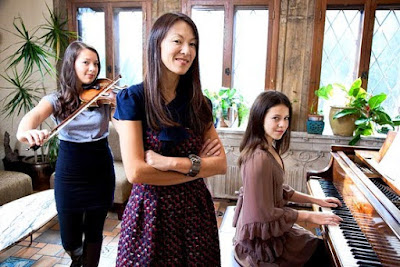0 comment Thursday, August 28, 2014 | admin
 Erin Patrice O'Brien for The Wall Street Journal
Erin Patrice O'Brien for The Wall Street JournalAmy Chua has penned an essay for the Wall Street Journal entitled, "Why Chinese Mothers are Superior." Following a bullet point list of things not to let your children do (sleepovers, playdates, school plays, TV or computer games), she notes three ways Chinese parents approach parenting differently from Westerners. To sum it up, Chinese parents assume, expect and demand excellence in their children.
Here are some snippets:
First, I've noticed that Western parents are extremely anxious about their children's self-esteem. They worry about how their children will feel if they fail at something, and they constantly try to reassure their children about how good they are notwithstanding a mediocre performance on a test or at a recital. In other words, Western parents are concerned about their children's psyches. Chinese parents aren't. They assume strength, not fragility, and as a result they behave very differently.
Second, Chinese parents believe that their kids owe them everything. The reason for this is a little unclear, but it's probably a combination of Confucian filial piety and the fact that the parents have sacrificed and done so much for their children. (And it's true that Chinese mothers get in the trenches, putting in long grueling hours personally tutoring, training, interrogating and spying on their kids.) Anyway, the understanding is that Chinese children must spend their lives repaying their parents by obeying them and making them proud.
Third, Chinese parents believe that they know what is best for their children and therefore override all of their children's own desires and preferences. That's why Chinese daughters can't have boyfriends in high school and why Chinese kids can't go to sleepaway camp. It's also why no Chinese kid would ever dare say to their mother, "I got a part in the school play! I'm Villager Number Six. I'll have to stay after school for rehearsal every day from 3:00 to 7:00, and I'll also need a ride on weekends." God help any Chinese kid who tried that one.Before you get too up in arms, it's only fair to acknowledge the vast cultural differences between the U.S. and China. And the political ones, like, say, democracy vs. communism. A child in the U.S. who had no social skills would not get far in business or team sports, generally speaking. He'd have to be a violin prodigy, or dictator . . . or something. In China, it seems, achievement is the goal; individualism, not so much.
 She's perched on a pretty high horse, most of the time, but still, there is merit in much of Ms. Chua's advice. For instance, children do waste hours on computers and TV. And there's certainly too much "self esteem" building going on -- at least in my school (and too many professionally made science projects, for that matter).
She's perched on a pretty high horse, most of the time, but still, there is merit in much of Ms. Chua's advice. For instance, children do waste hours on computers and TV. And there's certainly too much "self esteem" building going on -- at least in my school (and too many professionally made science projects, for that matter). When I hear a mother say, "tsk, tsk, that's a bad choice," as the child proceeds on to do the misdeed, I'm the first to smirk. And I cannot and will not muster an exuberant "wow" to a mundane Lego creation. Chua is right that praise for a mediocre performance can be the worst kind of white lie.
She also suggests that a child's academic performance reflects directly on the parent, and here I must part company. Though I struggle now for an example to prove my point. Truth be told, my son does much better in school when I drill him in multiplication and, frankly, the time spent in misery seems worth it, to him and to me.
I think it is her overall tone of superiority that bothers me, rather than her content, captured in statements like,
Chinese parents can order their kids to get straight As. Western parents can only ask their kids to try their best. Chinese parents can say, "You're lazy. All your classmates are getting ahead of you." By contrast, Western parents have to struggle with their own conflicted feelings about achievement, and try to persuade themselves that they're not disappointed about how their kids turned out.That's pretty harsh. But with China nipping at our heels, perhaps we'd all do well to be a little more Chinese.
Labels: Amy Chua, Chinese Mothers, Parenting, Superior Moms
